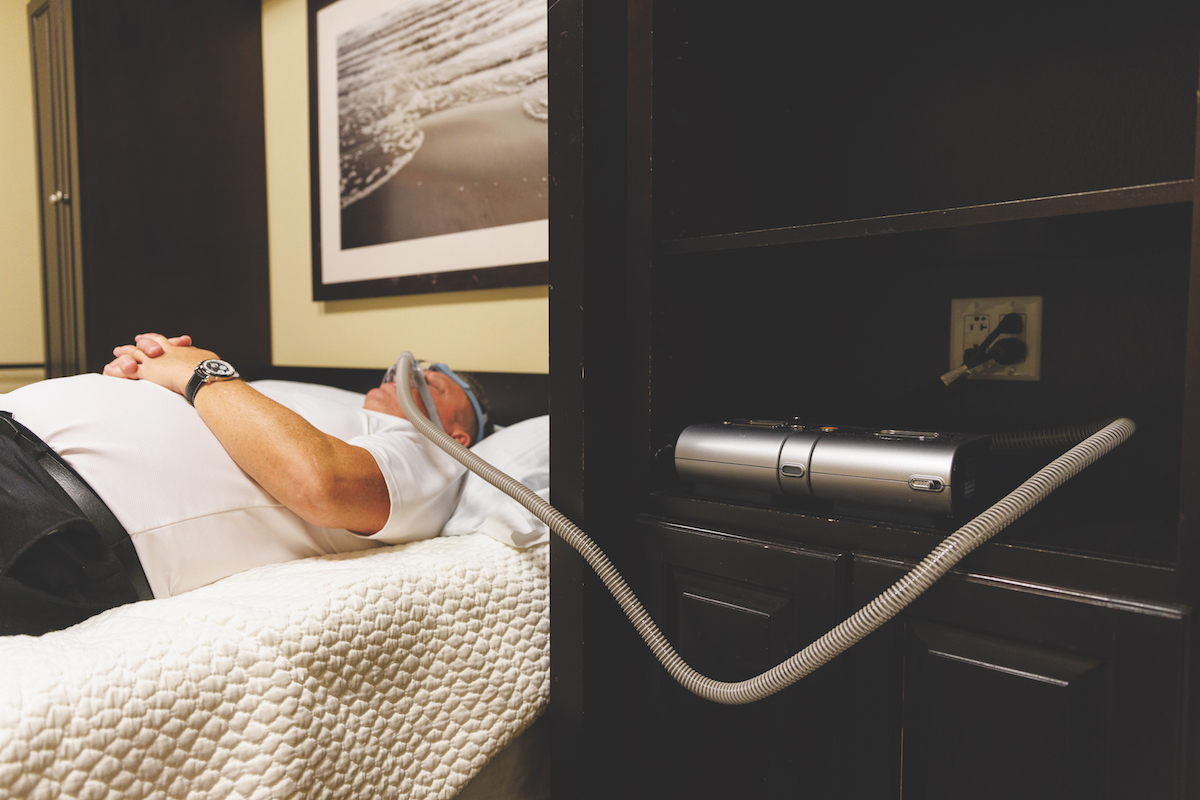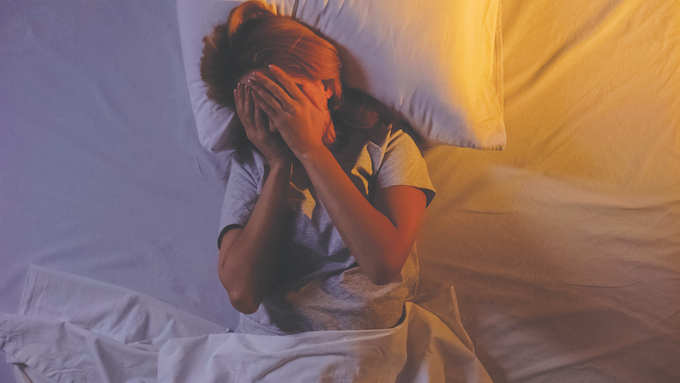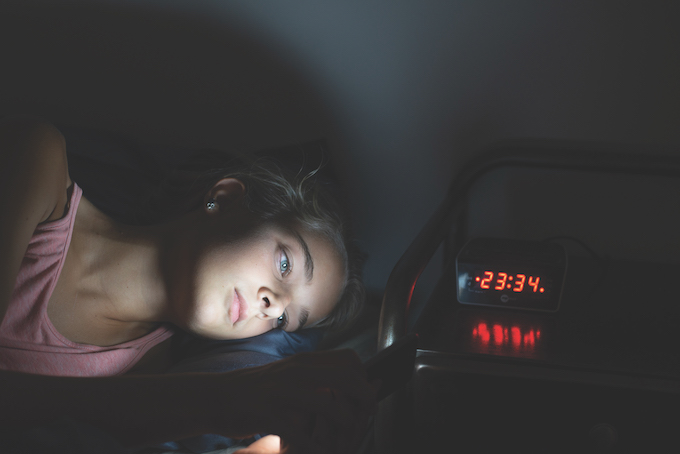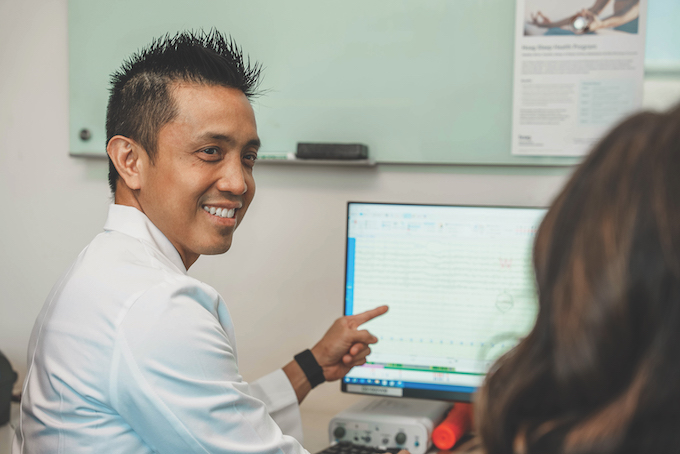
Hoag doctors offer advice and treatment for common disorders when restful nights prove elusive.
By Tanya A. Yacina
In a fast-paced world, the art of obtaining restful sleep is frequently underestimated. As a cornerstone of one’s well-being, a good night’s slumber is a deep physiological and psychological necessity, vital for cognitive functions, emotional stability and physical health.
Dr. Jose Puangco, service chief for the Hoag Sleep Health Program, including its Voltmer Sleep Center in Newport Beach and Hoag Sleep Center in Irvine, says restorative sleep is vital for overall health. REM sleep, in particular, solidifies memories and the learning process. Getting enough restorative sleep also helps with emotional stability, better stress management, improved attention span, alertness and problem-solving.
However, sometimes sleep can be elusive. It’s hard to shut off our minds as we think about events of the day, deadlines looming in the week ahead or other problems that may be weighing on us. But when trouble falling asleep becomes more than a nuisance every once in a while, it might be time to seek help.

“Everyone has occasional episodes of insomnia, but it’s the bad habits we pick up during these times, such as prolonged use of sleep medications or excessive caffeine intake, that have long-lasting effects,” says Hoag Sleep Health Program Supervisor Alana Sherrill. “For some patients with severe insomnia, they don’t really remember how it started, but they have picked up so many bad habits over the years, they’ve have forgotten how to sleep without them.”
The Science Behind Sleep
Achieving quality rest is a key part of well-being. Although one common diagram depicts good health as the intersection between diet and exercise, a more realistic picture is when diet, exercise and sleep intersect because sleep impacts all aspects of health, according to Sherrill, who is certified in clinical sleep health and is a registered polysomnographic technologist (the highest certification for health care professionals who clinically assess patients with sleep disorders).
She points out that Hoag was one of the first hospitals in Orange County to focus on sleep health by opening its Newport Beach sleep center in 1987. And its experts are well-versed in the medical reasons for getting good shut-eye, why this normal body function sometimes goes awry and how to get it back on track. Puangco explains that the glymphatic system is more active during sleep.
“This process clears waste products that accumulate in the brain during waking hours, particularly beta amyloid, which is associated with Alzheimer’s dementia,” he says. “Sleep plays a role in the endocrine system, such as production of cortisol (stress hormone), insulin (sugar metabolism) and growth hormones. It therefore supports metabolic health and stress response.”
Over the decades, the Hoag Sleep Health Program has grown from a small unit in the hospital basement to one of the largest sleep programs in the area. The program treats sleep disorders including insomnia, circadian rhythm disorders, narcolepsy, sleep apnea, hypersomnia and sleep movement disorders.
One of the program’s patients, Michael Helo, experienced interrupted sleep, tiredness, drowsiness when driving and a sore throat in the mornings, so he participated in a sleep analysis to figure out what was going on. For the study, his body and head were hooked up to wires to track his sleep pattern.

“During the beginning period, I was told to sleep as I have normally done for 138 minutes without a CPAP breathing device,” Helo says, noting that the results were positive for apnea-hypopnea with low oxygen levels.
After the first portion of the test, he was awakened and fitted with a CPAP breathing device, which he wore while sleeping for about five hours as the analysis continued. With the device, he says, results showed better sleep patterns and heartbeats per minute; his airway was also more open and he was taking in more oxygen.
Puangco explains there are many consequences to not getting adequate restorative sleep. Cognitive issues, mood disorders, a weakened immune system, increased risk of cardiovascular disease and diabetes, accelerated aging and reduced motor skills are all commonly seen in people not getting proper sleep, whatever the underlying reason may be. He says that one should seek professional help if a negative sleep cycle is affecting their health, productivity, social relationships, work, school or other activities of daily living.
“One reason we see a lot of referrals to the sleep center is when a patient has another condition that is resistant to treatment—for example, acid reflux, diabetes, atrial fibrillation, headaches and obesity,” Sherrill says. “If you’re trying to improve your health and nothing is working, it’s time to check out what’s happening while you sleep.”
After Helo completed the sleep analysis at Hoag, he met with Dr. Yvette Gozzo, a board-certified pulmonologist and sleep medicine specialist in the Hoag Sleep Health Program, to discuss his results and treatment options. Helo says once he began full use of a CPAP device, his sleep pattern became deeper and he was more alert and energized during the day.
“I have used my CPAP device while traveling both internationally and domestically since 2016 and would be lost without it,” Helo says. “I would say to others, ‘Don’t be or feel embarrassed to take the first step to better health and sleep, not just for yourself, but those around you.’ ”
Solutions for Quality Slumber
General sleep problems can affect people whether or not they have a more serious underlying condition. For example, stress, late-night technology use and even eating a meal too late can cause general sleep disorder.
“Sleep problems often have an isolating effect because it’s night and, especially, if your bed partner is fast asleep. This is why a lot of people will turn to social media [use] at night,” Sherrill explains. “Resist the urge to pick up your phone. Don’t look at the time and don’t open social media. And, before you drink cherry juice or CBD oil based on Dr. Google’s recommendation, it’s best to seek professional help.”

Sherrill also recommends giving yourself “something to sleep about.” She says when we sleep, our body is busy with things like healing and processing memories. So, if someone has been sitting at a desk all day or lounging on the couch binge-watching a favorite TV series, they potentially aren’t going to sleep well. Go for a walk, talk to a friend or read a book—all will help you sleep better.
Puangco, too, discourages the use of technology before bedtime, and says blue light exposure from video screens and certain lighting suppresses melatonin, which affects the onset of sleep. He says cognitive stimulation prior to sleep affects the ability to wind down and affects time spent in restorative sleep.
“Activities in the hour prior to bedtime should not involve screens or too much cognitive stimulation,” he says. “Instead, try meditation, reading a book or working on a jigsaw puzzle.”
Puangco explains that meditation and relaxation techniques can also contribute to better sleep by decreasing arousal and stress, regulating emotions and improving restorative sleep through progressive muscle relaxation and deep breathing exercises.
“Sleep isn’t an off switch. You’re not just awake or asleep,” Sherrill says. “Your brain slowly falls asleep in stages, leaving the perfect window to think about all your stress and worry. There are so many resources available to help you cope with stress and anxiety, otherwise they will bubble up right as you close your eyes.”

Sherrill says that physical activity is part of our circadian rhythm, which controls our sleep/wake cycle, and something simple like a light walk can significantly improve sleep patterns. Additionally, she says diet and meal timing have an interesting relationship with sleep—you can read that eating before bed is a “don’t”; however, if you go to bed hungry, all you will do is lie there thinking about how hungry you are. If necessary, she recommends getting up for a light snack to balance your hunger.
Puangco recommends getting up at the same time each day—sleep onset depends on this, and keeping a regular structured sleep routine is important. He also suggests avoiding naps during the day because they can interfere with sleep onset and total sleep time.
“Having a nighttime routine that starts one hour before bedtime prepares the brain for sleep and helps us fall asleep easier,” he says. “It’s important to give the brain clues that we are about to sleep so it can fall asleep faster and stay asleep longer.”




